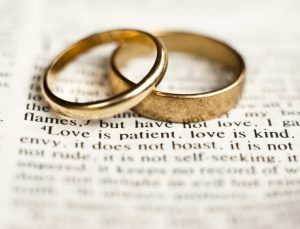Marriage is a great institution and one which has been established by God. This is the primary passage in the Bible regarding the union between a man and woman.
Therefore shall a man leave his father and his mother, and shall cleave unto his wife: and they shall be one flesh. And they were both naked, the man and his wife, and were not ashamed. (Gen. 2:24-25)
The first aspect of marriage is that it begins a new family. The man leaves his parents and he and his wife start their own unique household. This is not to say that the parents and other family members are forsaken, but that their union constitutes a newly formed family unit.
The second aspect is that there is a bond between the man and woman. The husband cleaves unto his wife. The Hebrew word for “cleave” means to “stick to” or “stay close to”. Jesus elaborated on this theme when He said, “What therefore God hath joined together, let not man put asunder.” (Matthew 19:6)
The third aspect in this passage is that there is intimacy between the man and woman. God reserves the expression of sex for marriage. Our culture has moved away from this standard, but it is a timeless biblical standard which should be observed. Sexual expression is a rite of marriage, so to speak. As God instructs, “Marriage is honourable in all, and the bed undefiled: but whoremongers and adulterers God will judge.” (Hebrews 13:4)
Marriage is a God-ordained institution and as such, God defines it, not our culture. This union is defined by God in the Bible as always between one man and one woman. While this standard has been defined by our culture as narrow-minded, old-fashioned, and far worse, it has been the undeniable standard throughout the ages.

